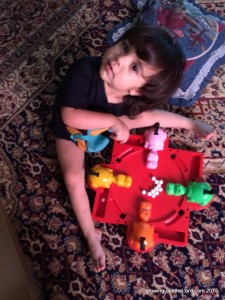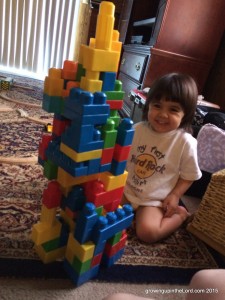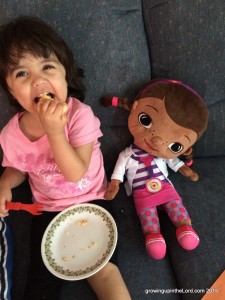My Three-Year-Old to English Translation Guide
Posted On September 11, 2015
Do you ever look at your child and say, “You’re really cute, but I have no idea what you are saying!” I have several of these moments with my almost-three-year-old. After a spectacular and well-witnessed incident, I decided she needed a Seven Quick Takes completely devoted to her developing language skills.
- What’s in a name? She calls herself Mah-nie, though Maddie would be a more c
 orrect short form of Madilynn. She calls Dietrich “Dee-Dots” – I love that she’s made his name plural. This is when she isn’t calling him “diet” because Peter often calls him Diet-Rich to be silly.
orrect short form of Madilynn. She calls Dietrich “Dee-Dots” – I love that she’s made his name plural. This is when she isn’t calling him “diet” because Peter often calls him Diet-Rich to be silly. - Toys and Television. First the story behind the post: while hanging out with our church friends, she kept whining “hun-ghee ma-mals” at me. Several minutes this continued. Finally, she dragged in a Hungry Hungry Hippos game, and I understood. Another expression that took me awhile “Echoes Bared” while means “Legos”
Two words that make little sense in Madilynn-ese are FaLas and LaLas which are Princess and Mario, respectively. Her favorite shows are Sunshines or Little Einsteins (this one also took me a little while to figure out) and Doc Hah-mas, Doc McStuffins.
Little Einsteins (this one also took me a little while to figure out) and Doc Hah-mas, Doc McStuffins. - Restaurants and food. Chichen Press is Chicken Express, Chicky Racecar is Chick-fil-a because the play place has a racecar, and Sockick is Sonic where she orders a pupull frushy (purple slushy). If she should tell you she wants a “brape” that would be a grape.
- Basic pronunciation. Some words are simply shortened, like exercise is simply “size” and hello becomes “LO!” C’s often come out with at T sound – I “tan” do it. “Tat” meow; R’s and L’s typically have an adorable W roll. “Sit wap now” means she wants to sit on my lap. Friends becomes Fwends, Pray and Play
 are both “Pway.”
are both “Pway.” - Context is everything. As in the example above or this one: “Chi-chen” can be chicken, except when she says, “Chi-chen wuhld” which means “Jesus loves the little children of the world.”
- Beebins are penguins and afants are elephants.
- Everyday phrases (for us). Sit on ouch (couch), pi-pitch cheese (take picture/say cheese), Choon is a spoon, Puddles are cuddles/snuggles – which often occur on my “wap” sitting on the “ouch.” If she says “monkey back” that means she wants a piggyback ride. This came about because I asked if she was a monkey on my back and she said yes. Since we have a pharmacy in our house to fight the allergy/asthma situation, she nightly asks for mem-ness, her medicine.
This is a quick reference guide and likely not everything you need to understand Madilynn-ese. What funny words and phrases do your children use as they develop their language skills? I’d love to hear from you in the comments!
12 Comments
I think Dietrich (7) confused the two words a few weeks ago after watching Octonauts! I sometimes take a while to catch up with him, but once I figured it out, we laughed.
My son, who is five, calls the algae in the fish take “allergy.” I am 85% sure that he knows he’s wrong, but he says it anyway, and it’s cute so I’ve stopped correcting him!
Rabia @TheLiebers recently posted…THe ABCs of Blogging {Old-School Style}
Dietrich’s “Madilynn” sounds like “Madlin” or some other faster/slurred version. People didn’t know what he was saying when they were so much younger. I do laugh at the cuteness of “Dee-dots” every time she says it, 500 times a day – mostly because she made his name plural.
Aww, my favorite is when babies start to say their siblings’ names. As if they couldn’t get any cuter!
Jenny @ Unremarkable Files recently posted…7 Quick Takes about Things That Look a Lot Better, Awkward Photo Shoots, and Playtime in an Amputee-Friendly Household
Dietrich actually laughed at me a few days ago when I mixed up kitchen/chicken (I don’t remember which, but he thought it was so funny!).
As mother of the author of this post, I’d like to share some of her 3 year old “Angie-isms”. “Ceary sauce” was baby cereal mixed with applesauce. “Appigator” and “appergies” were alligator and allergies. “Sawl” and “drawl” were saw and draw. Even as an adult, she sometimes uses the words chicken and kitchen or check up and catsup interchangeably. My favorite was a word that it took me three or four days to figure out. One day, when I asked her what she was talking about, she pointed at a big yellow school bus and said, “That’s a skirbirsh!”
I enjoy the funny one much more than the “threenager” moments!
So funny! I often have to make my three year old repeat things too and the things she comes up with can be very entertaining!
Visiting from Small Victories Sunday
I do attempt recording her, but she tends to turn “shy” when I want her to perform “on command” for the video. She’s feisty, fiery, and keeps me on my toes for sure! I’m so glad you stopped by!
Thank you for this amazing comment full of encouragement and love!
OH…I love this! My mother kept a list of many of the early words in my vocabulary. I have that baby book to this day and am 67 years old. I never had children of my own so do not have that delight in recording the “Madilynn-ese” of my child. I have actually had hundreds of kids as a teacher but not quite this young on a big scale. But I love kids of this cute age.
Let me share a few out of the “Linda-ese” vocab:
Da-dee up = when alarm went off
boo-boo = anything that flies
boo-boo icky = a fly
I also said “lo” for hello.
nauny-nauny = naughty
durdos = turtles
tory = story
So, keep those notes, sweet mother. They will mean something to your little one…one day!
Caring through Christ, ~ linda
~ linda recently posted…Praising the Creator
Love this – my daughter used to say lollow for yellow and pagetti for spaghetti. Great memories. May I make a suggestion – make a recording of her saying some of these sweet things. I had a recording of my daughter singing but she later recorded over it – sigh. Thanks for sharing.